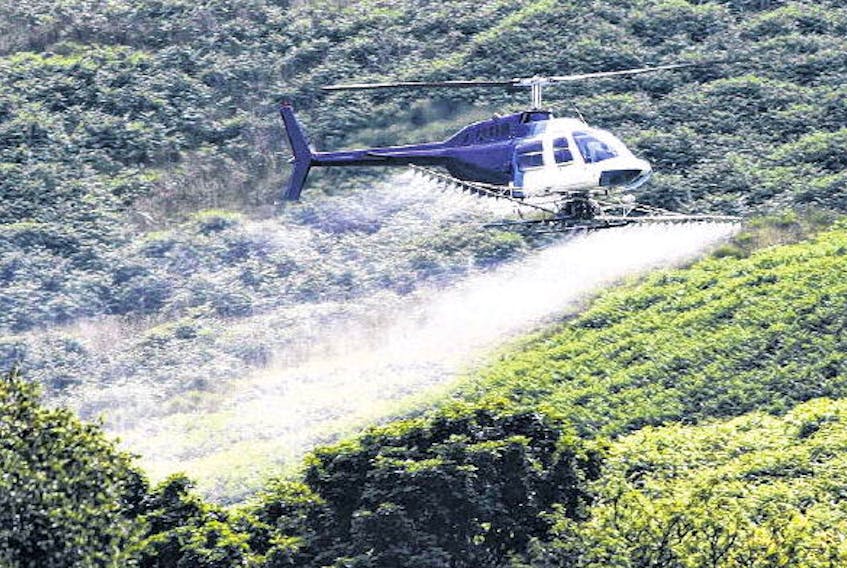It’s spray time again in Nova Scotia forests.
More than 2,000 hectares of privately owned woodland is to be sprayed, mostly with the herbicide VisionMax.
The active ingredient in Vision-Max and Roundup is the controversial chemical glyphosate.
“We think that the public should be consulted,” said Lenore Zann, the MLA for Truro, Bible Hill, Millbrook and Salmon River. “There is a strong, strong feeling out there.”
The feeling, reinforced by a recent American court award of $289 million and a World Health Organization directive, is that glyphosate can or probably can cause cancers.
“The stuff should be banned worldwide,” said Raymond Plourde of the Ecology Action Centre. “That’s my opinion, fullstop.”
But there appears to be no stopping the application of the herbicide in provincial woods.
Northern Pulp, the company that runs the Pictou County mill in Abercrombie Point, has applied to spray 794 hectares of forest in Halifax, Hants and Colchester counties.
“Glyphosate is one of the most extensively studied herbicides,” said company spokeswoman Kathy Cloutier. “It’s been approved for use in Canada since 1987. It’s actually more widely used in agriculture than in forestry. We trust those scientists that deem it safe and we will continue to use it as a product that is recommended for this purpose.”
The purpose is to to cull hardwood from woodland stands to allow the unimpeded growth of coniferous softwood that the Pictou County mill uses to produce kraft pulp.
“We use 2.8 litres of product, VisionMax, per hectare,” Cloutier said. “These are highly monitored, with wind checks every 15 minutes. We have monitors from Nova Scotia Environment on site.”
Cloutier said vacations in the Environment Department have slightly delayed Northern Pulp’s application but she expects approval by the end of the month and the spray, including 705 hectares of aerial application, is expected to be finished by the end of September.
The Environment Department has already approved spraying to cover about 1,351 hectares of forested land, including three aerial and threeground sprays. The companies that have been approved are MacMullin Forestry Consulting of St. Andrew’s, Antigonish County, JD Irving Ltd., and Century Forestry Consultants of Pictou. Those sprays will take place in Antigonish, Guysborough, Colchester, Cumberland, Pictou and Richmond counties.
A spokesman for the Environment Department said in an email response that all spray applications are carefully reviewed by staff.
“To date, no applications submitted in 2018 have been rejected,” Bruce Nunn said. “If an application is approved, it contains terms and conditions that must be followed by the approval holder.”
The terms include requirements such as public notifications, buffer zones or separation distances from the spray and municipal water, maximum wind speeds when it can be applied, certification requirements for the applicator and strict adherance to the information on product labels.
Inspections are conducted based on risk, for example, the proximity to environmentally sensitive areas, he said.
Nunn said that any pesticides used must be registered through Health Canada’s Pest Management Regulatory Agency. This federal agency determines whether a product is safe for use. All 10 provinces currently allow pesticide spraying.
Two years ago, the province’s chief public health officer said “there is no evidence that glyphosate creates a risk to human health if used properly.”
Dr. Robert Strang said at the time that glyphosate poses no risk to humans if the Environment Department “is monitoring where, how and when it is used.”
“Even water can be toxic if too much is consumed in a short period of time,” he said. “The difference is between the possible hazard and the real-life risk.”
That’s not much comfort for Zann.
“That doesn’t make me feel better,” she said.
“Has he done his own research? I’d like to see a separate, independent report. From reportings from around the world, I am not convinced it’s safe.”
Donna Crossland of the Healthy Forest Coalition said she sparingly uses Roundup for controlling invasive exotic plants in the park where she works but her problem with the forest spray is that it doesn’t do what is intended.
“Gradually, when you spray out the hardwoods,they are the deeprooted species and they are able to bring nuturiets up to the surface, nutrients that trees need to grow,” Crossland said. “If you grow only softwoods, kill the hardwoods with theglyphosate product, then the nutrients become
depleted in the soil. Gradually, over time, the growth rate diminishes because the nutrients aren’t there. Then there will have to be a fertilizer input. It’s an unsustainable way to grow forest products.”
Both Crossland and Plourde took issue with Bill Lahey in his forest practices report released Tuesday, supporting the use of sprays on Crown land with the taxpayer picking up the tab.
“That is not going to go over big with the public who said they are absolutely sick of glyphosate spraying in this province and beyond,” Plourde said. “Mounting scientific evidence across the world has indicated that it is a likely carcinogen. Scientists in Canadian provinces have warned people harvesting deer and other wildlife not to eat things like livers and other organs becuase it may concentrate the glyphosate and affect people.”
He said he takes the forestry point that they only spray the same stand of trees one or two times in decades, while it’s used more regularly and frequently in food crop production.
“I don’t support that either. I would say that there is enough scientific evidence that it is a likely carcinogen as the World Health Organization has said, to say that the logical and smart and appropriate thing for governments to do is to take the precautiounary approach and ban its use.”
A spokeswoman for the provincial Agriculture Department said in an email that the Pest Management Regulatory Agency determines whether a pesticide product is safe for use.
“In 2017, they reaffirmed their position on glyphosate that it does not present risks of concern to human health or the environment when used according to the revised label directions,” Chrissy Matheson said. “Locally, Nova Scotia Agriculture follows all federal rules around this product.”
Still, a California jury decided recently that Monsanto, the giant herbicide company that produces Roundup and VisionMax, must pay a former groundskeeper with terminal non-Hodgkin lymphoma $289 million in damages for failing to warn him of glyphosate’s cancer risks. Dewayne Johnson, the plaintiff, testified that he sprayed large amounts of weed killer on the job and was accidentally doused with the product on two occasions.









